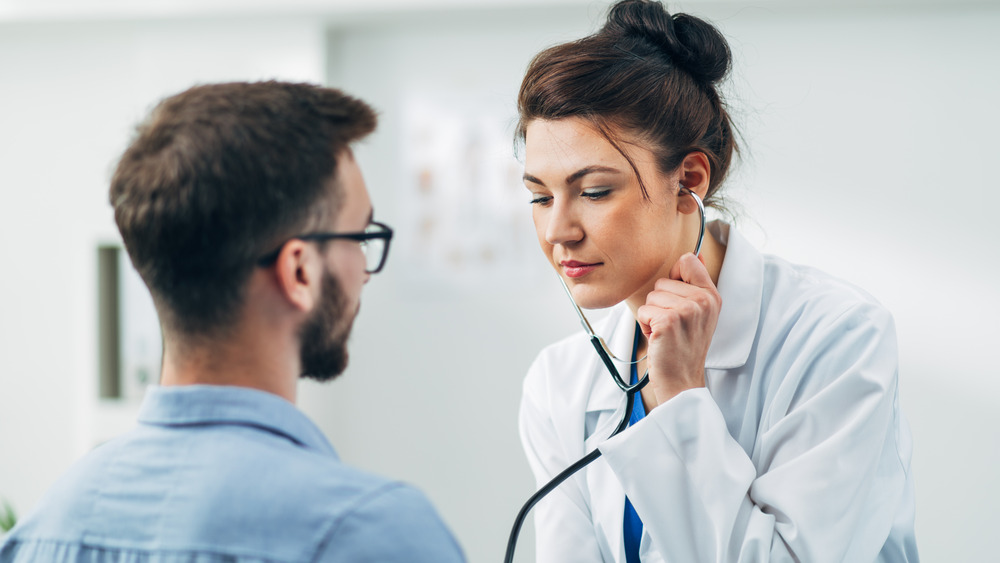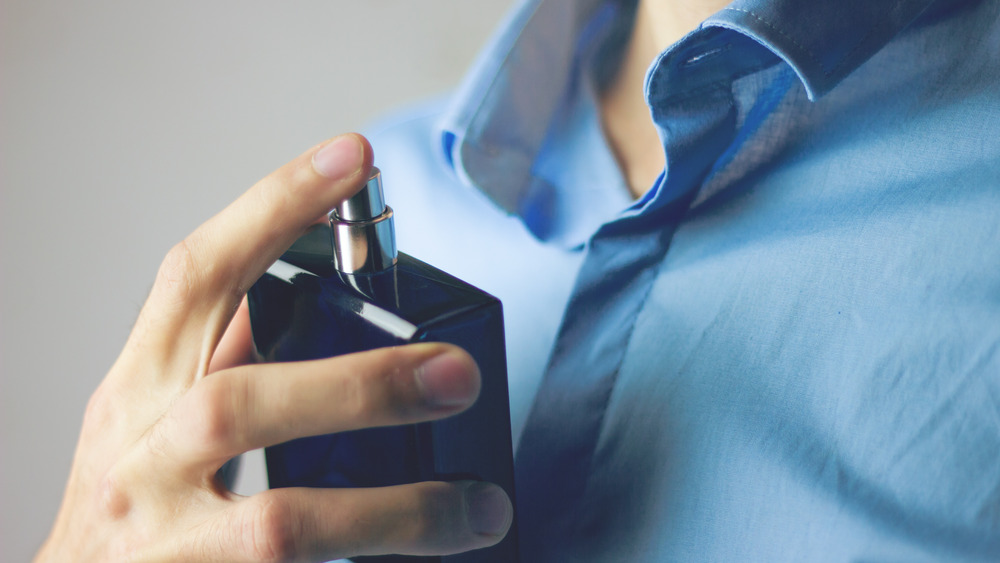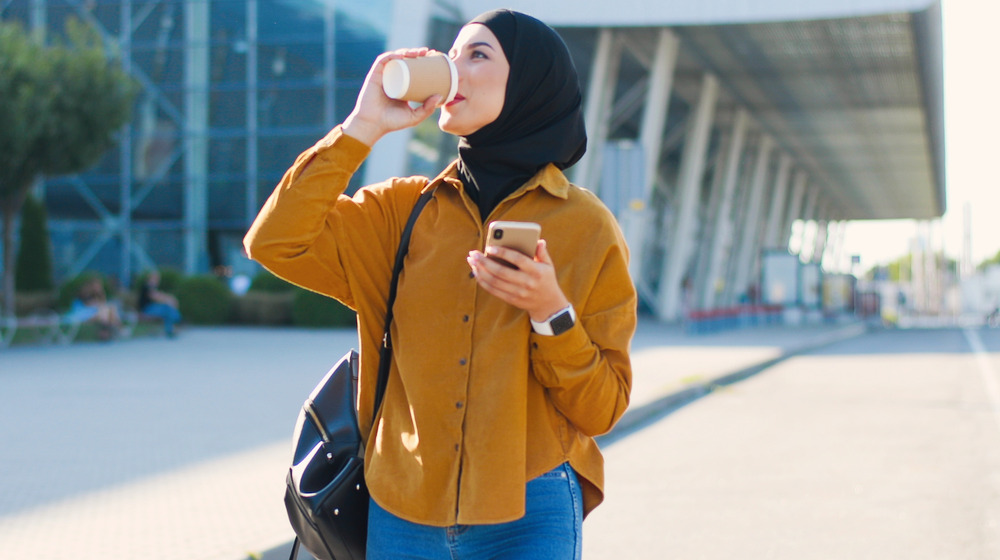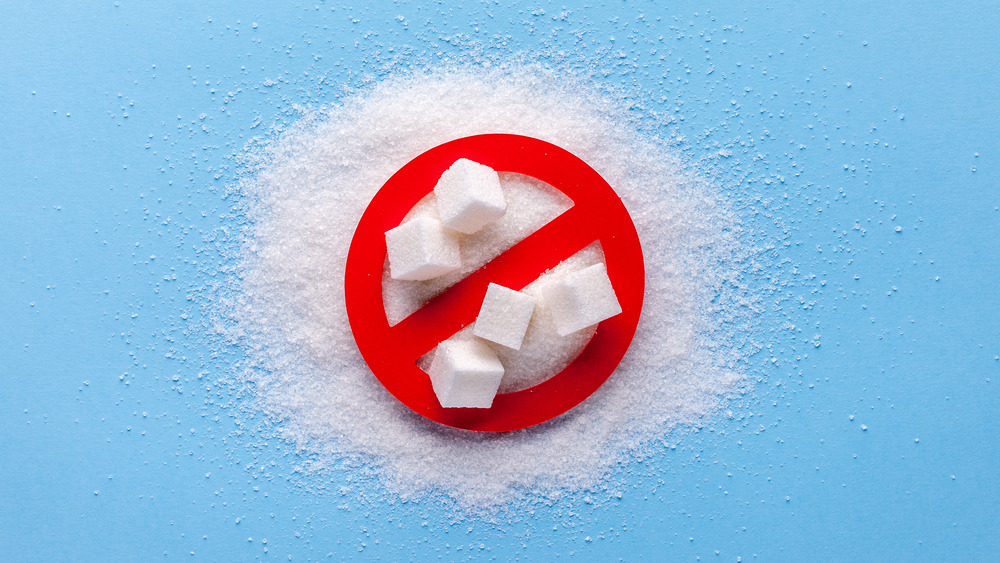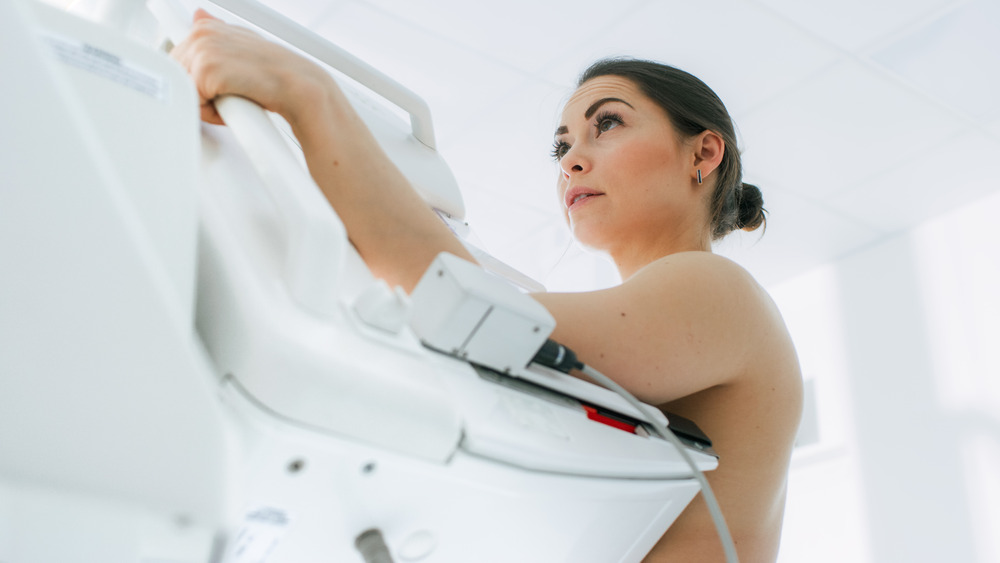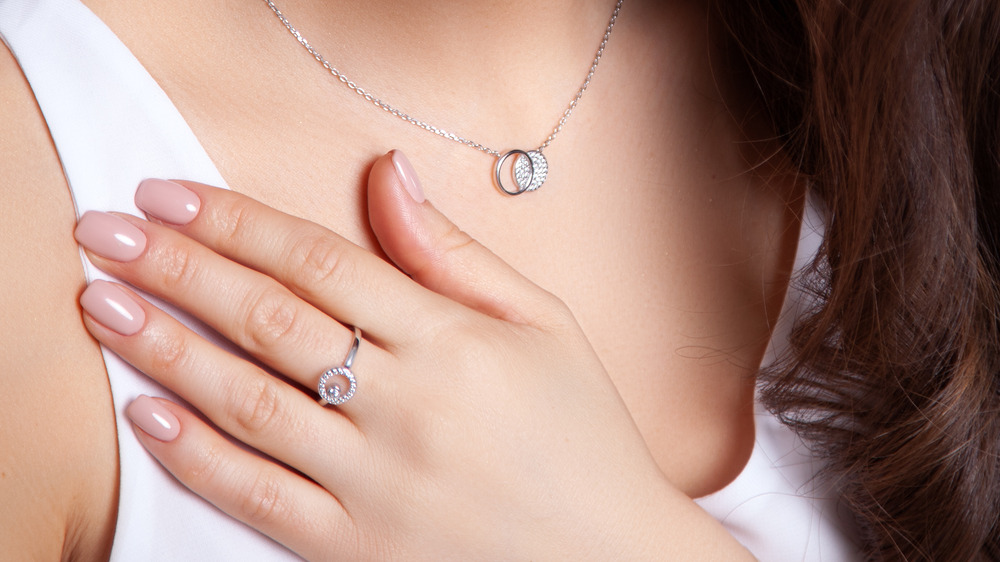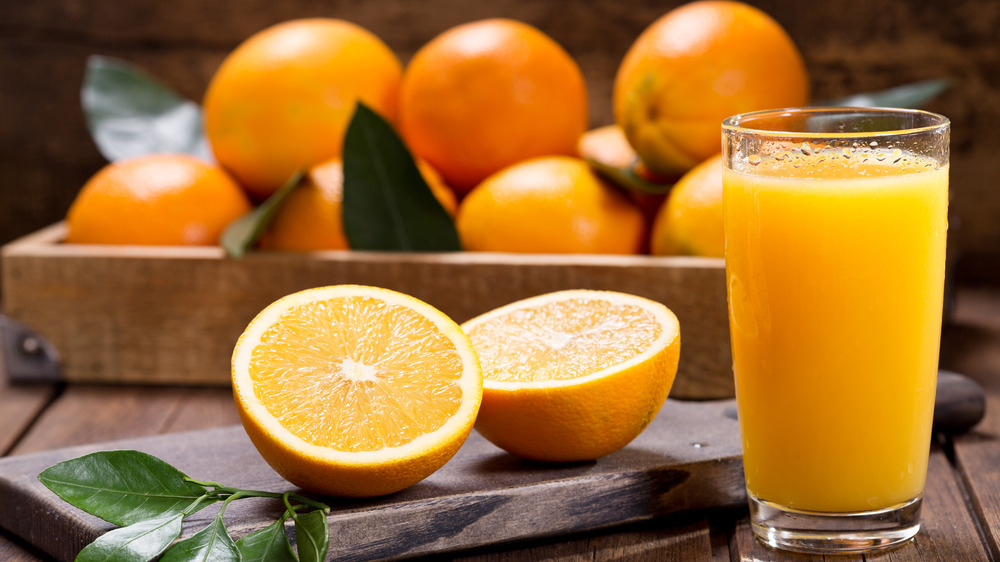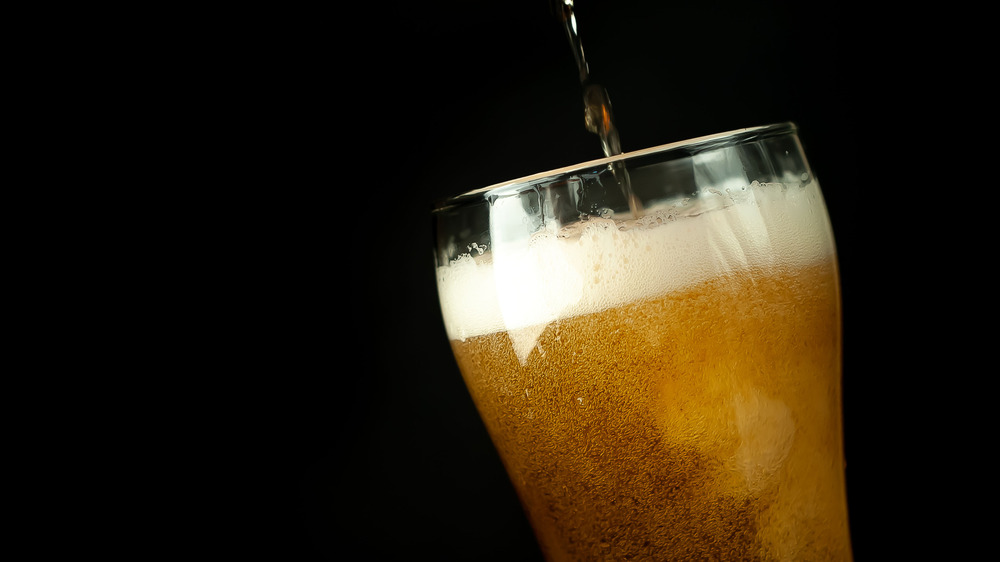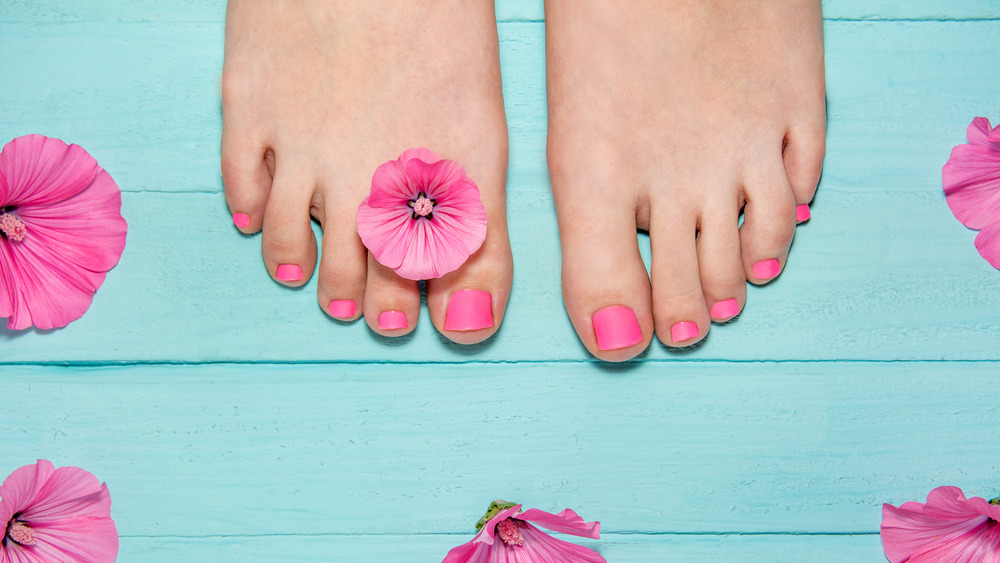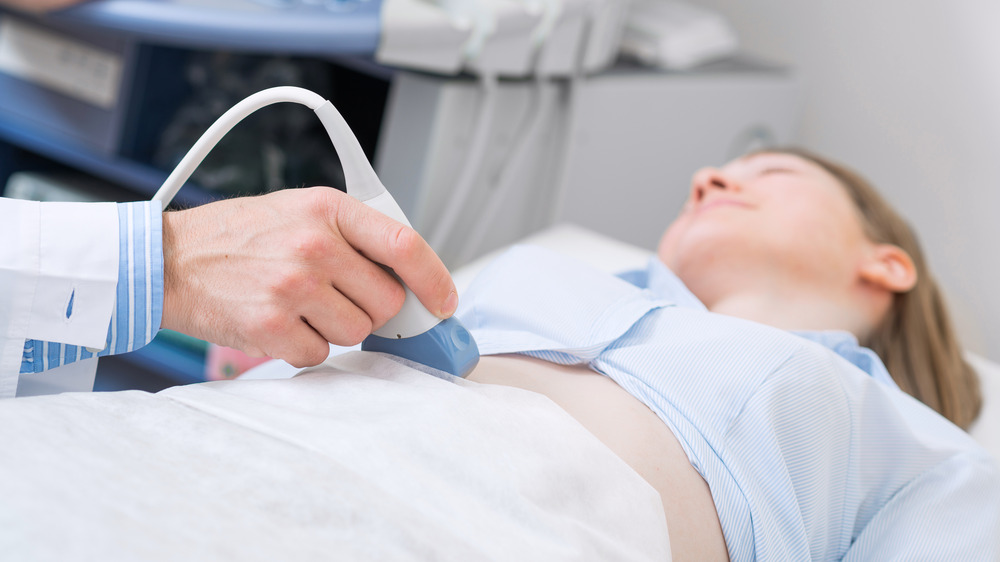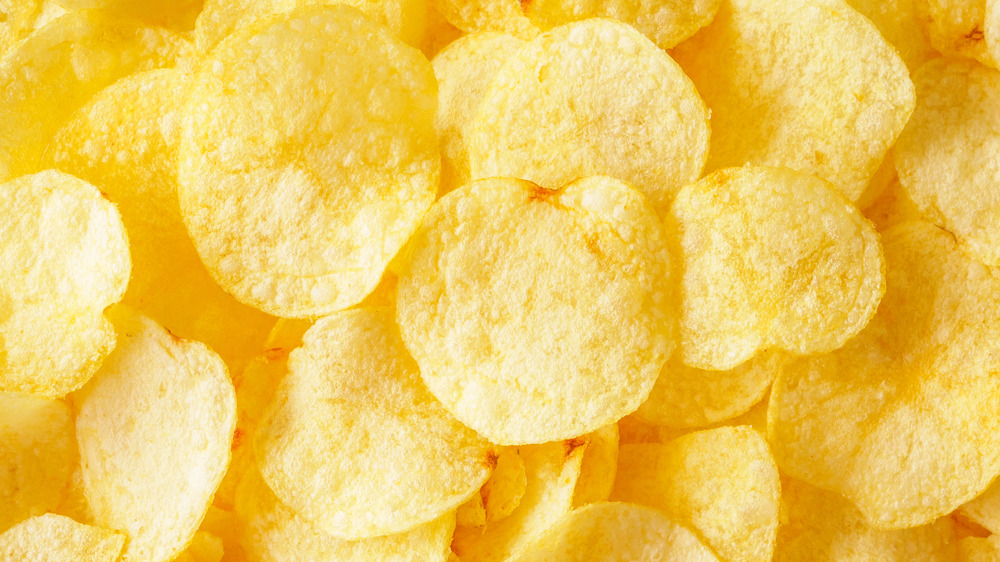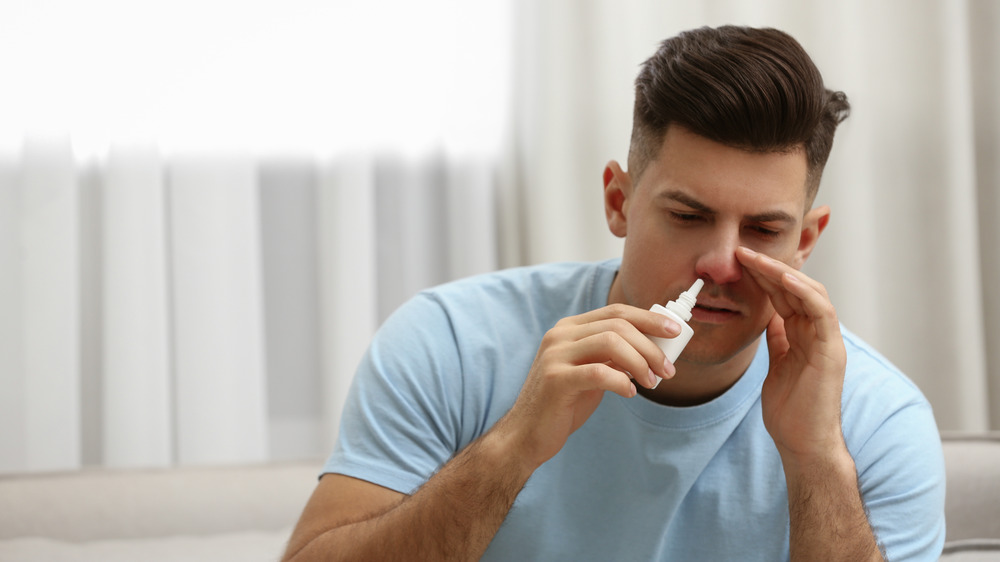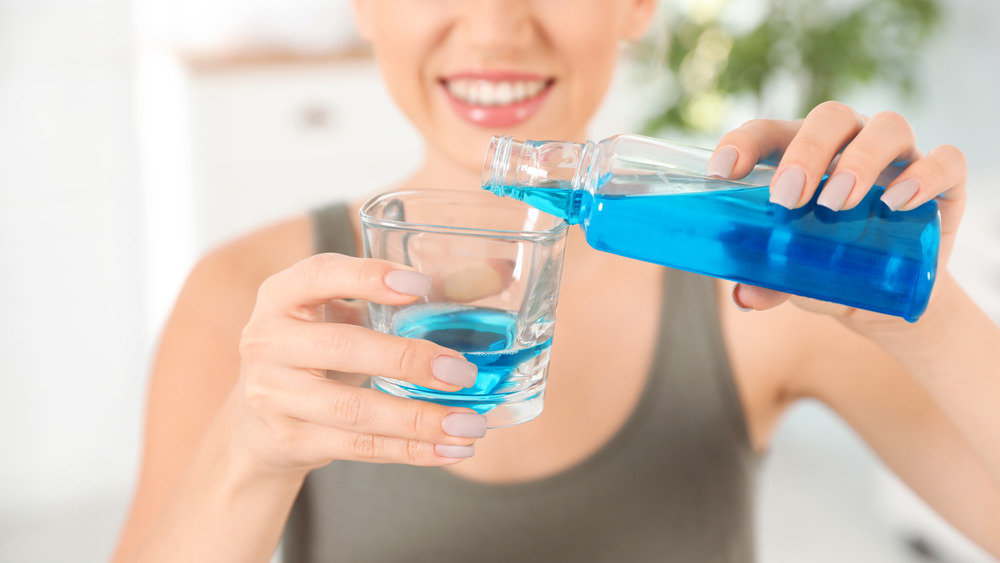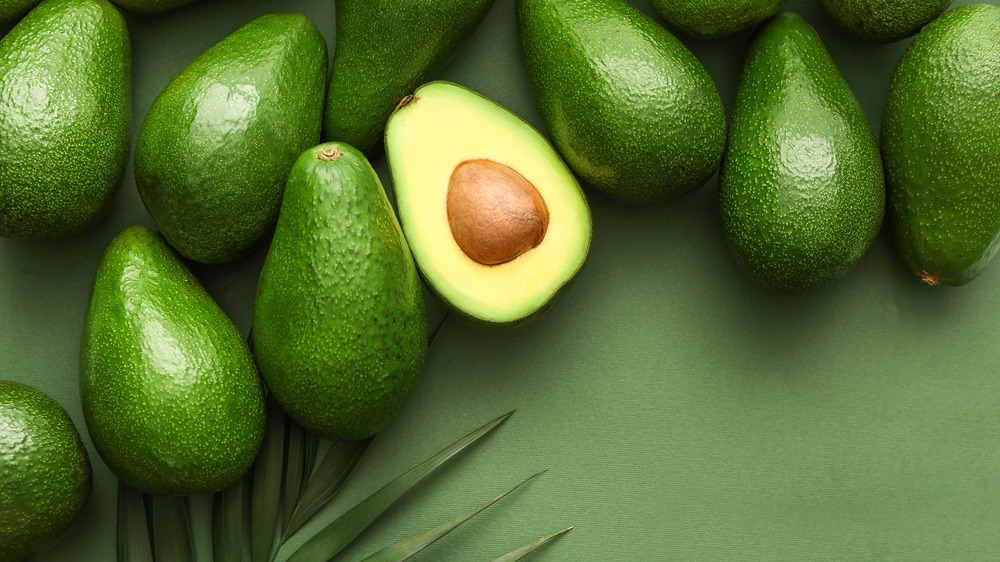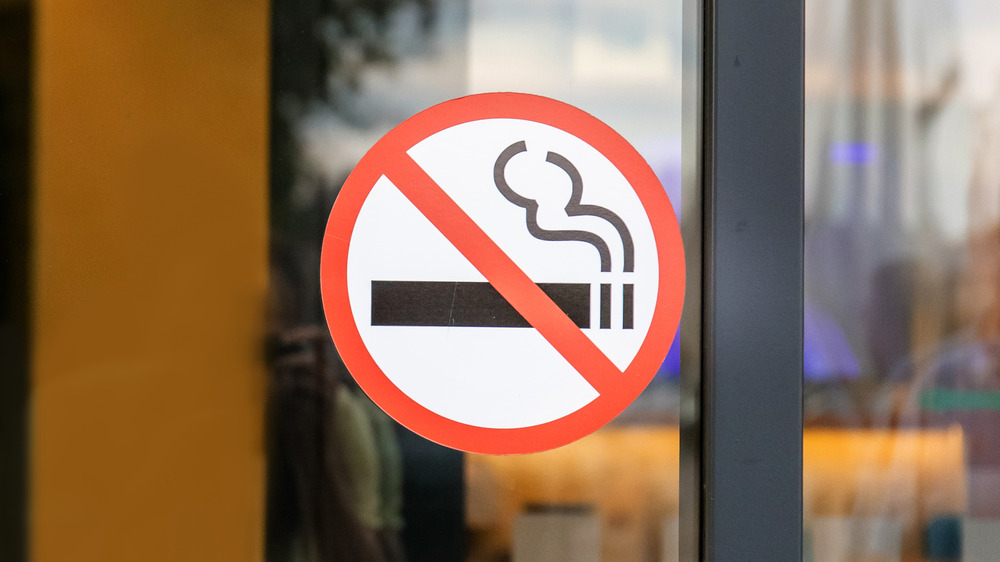Things You Should Never Do Before Going To The Doctor
Let's try a little experiment: Take a moment to think about how many different types of doctors exist in the U.S. And really think about this in terms of specialties and medical focuses. Do you have your number? Okay, now here's the answer. According to the Association of Medical Colleges' website, in the United States there are more than 135 specialties and subspecialties in the medical industry. These range from pediatrics to geriatrics and can be as broad as general surgery to as specific as orthopaedic surgery of the spine. So it's not surprising that different doctors may require you to take different types of tests and procedures.
However, sometimes patients forget there isn't a blanketed approach for preparing for a doctor's appointment or diagnostic test, regardless of what you're having done. For some, you'll have to fast. For others, you might only need to avoid certain foods. And in some cases, you may have to skip a regular part of your daily routine even if you're just going for a general checkup. Can all this be a bit inconvenient? Honestly, yes, but the trade off is you increase your chances of more accurate and more helpful medical care. Let's take a look at some of the things you should never do before going to the doctor.
Never wear perfume or cologne to the doctor's office
Whether it smells like a field of flowers or the breeze off a tropical sea, perfume can be an instant mood lifter. It's one of those indulgences that can help you feel good, which is great if you need to do something that can be stressful. Perhaps you always spritz yourself before going to a doctor's appointment. Unfortunately, just because a scent puts you more at ease, that doesn't mean it has the same effect on your doc.
Dr. Jennifer Middleton revealed on KevinMD that perfume can make it harder to do her job. "Along with about 8.4% of the US population, I have asthma," she explains. "To promote good doctor-patient communication, I can't sit too far away from you. To perform a high-quality physical examination, I must enter into your personal space. Several minutes of inhaling that strong scent, however, can cause me to have trouble breathing."
Many products like colognes, perfumes, and body sprays can also aggravate allergies (via Healthline). Plus, even if your doctor doesn't have allergies or asthma, other staff as well as patients in the waiting room could. The next time you have to visit your doctor, consider leaving your favorite scent at home.
Don't drink coffee just before seeing your doctor
For many, coffee is an absolutely essential part of their morning routine. Whether it's brewed at home or by a local barista, that cup of joe becomes especially important for non-morning people who need to be alert early in the day. So if you have an early doctor's appointment, why not have a little caffeine?
Unfortunately, coffee can throw off a test done at most standard checkups. "Using coffee or other caffeine such as energy drinks or colas within an hour of having your blood pressure measured can make the number artificially higher," Dr. James Dewar, physician and vice chairman of family medicine at the University of Pittsburgh Medical Center, explained to East Lakeland OB/GYN Associates, PA.
If you really crave your cup of caffeinated coffee in the morning, you might want to bring it in a travel mug. This way, you can enjoy it immediately after your appointment. Or, you can run a quick search for coffee shops near your doctor's office.
Avoid eating before certain blood tests
Should you fast before a blood test? If you said, "yes," you're partly right. As Medical News Today explains, doctors use blood tests to check for a number of possible health concerns, and while not all types of blood tests require fasting, you definitely should fast for eight to ten hours before a fasting blood glucose test (see, it's there in the name).
According to the site, having diabetes can lead to higher than average (and unhealthy) blood sugar or glucose levels. Now, obviously eating and drinking can raise your sugar levels, but with a fasting blood glucose test, your doctor wants to see how much sugar is in your blood without any "help" from outside sources. This is why you need to fast for so many hours before taking this test. Otherwise, you could be incorrectly diagnosed as diabetic or prediabetic.
If you have concerns about fasting, you may want to schedule your appointment for early in the morning. That way you'll do most of your fasting while you're sleeping. And you can drink water while fasting (via Medical News Today) to avoid dehydration.
Never wear deodorant to a mammogram appointment
There's an old saying that goes "never let them see you sweat." When it comes to getting a mammogram, however, a little perspiration (and, yes, even odor) may be a fair trade off to avoid being misdiagnosed with cancer.
According to the American Cancer Society, you should not wear antiperspirant or deodorant before a mammogram because they can appear as white spots on an x-ray. And even if this mistake is cleared up, just briefly thinking you may have cancer or having to get a second mammogram can be extremely stressful for both you and your loved ones. Consider thoroughly washing your underarms before getting dressed for your screening to make sure there's no deodorant residue remaining.
Once the procedure is over, you can, of course, resume wearing deodorant. But if you're still concerned about looking and smelling a bit ripe, try putting a gauze pad under each arm to absorb at least some of your sweat and help minimize any concerning odors. And for your comfort, don't schedule a mammogram the week before your period when your breasts may be tender and swollen.
Avoid wearing metal when your doctor sends you for a CT scan or MRI
Take a moment to think about how much metal people wear every day. Did you remember wedding bands? How about watches? How about removable dental work? Don't worry, it's easy to forget these things, especially if you typically wear quite a few metal items. But for certain medical tests, you definitely don't want metal anywhere on your body.
Newark Beth Israel Medical Center advises patients that items like hearing aids, eyeglasses, hairpins, jewelry, and dentures can all throw off a Computerized Tomography scanning (CT scan)'s images. And considering this type of test is used to detect tumors and damage to your organs and bones, you don't want there to be any mistakes.
Besides CT scans, the Medical Center's website also recommends removing metal items when having an MRI. In fact, it expands the list to include pins and metal zippers, which along with hairpins can interfere with the test's results. Plus, certain items like credit cards, hearing aids, watches, and jewelry can all be damaged by an MRI scan. So, if you have either of these tests scheduled, wear as little metal as possible, and if you're not sure about an item, ask your doctor.
If your doctor sends you for a colonoscopy, avoid drinking orange or red liquids
Do you like orange juice in the morning? How about a red-colored electrolyte drink after a workout? If these are some of your favorite beverages, then get ready to go without them the next time you have a colonoscopy.
According to Healthline, there are different preps, depending on why a person is having a colonoscopy, but as Dr. Ashkan Farhadi said, "I tend to prefer a whole day of a liquid diet for everyone." However, all this prep to help clear your bowels means what you do drink and eat (Jell-O is allowed on the liquid diet) is not absorbed like it normally would be because your body is processing it faster. So, if the liquids in your liquid diet are red or orange, they'll still look red or orange in the colon and could be confused for blood.
If you feel like you can't go without a sports drink after a workout, Dr. Farhadi tells Healthline that green- or yellow-colored ones are safe before a colonoscopy. And don't be afraid to ask you doctor if certain foods are allowed before your procedure especially if you have other health concerns like diabetes or hypoglycemia.
Never drink alcohol before your doctor's appointment
In Hollywood, it's been both a source of comedy and drama. In reality, it's been outlawed and embraced. Yes, we humans have a complicated relationship with alcohol, but even though some types like red wine have medicinal properties, drinking any alcohol before a doctor's appointment may not be a good idea.
As Verywell Health notes, alcohol can throw off the results of a cholesterol test even if you only indulge in heavy drinking every now and then. And you don't want false readings on this test since it can help determine if you're at risk for a stroke or heart issues, allowing you to address these possible problems before they become actual problems. To avoid an inaccurate cholesterol test, you should not have any type of alcohol 24 hours before your procedure (via Verywell Health). You also should inform your doctor if you regularly drink. Yes, this may feel a bit embarrassing, but keeping your doctor in the loop is important.
If you, or anyone you know, is struggling with alcohol addiction, help is available. Visit the Substance Abuse and Mental Health Services Administration (SAMHSA) website or contact SAMHSA's National Helpline at 1-800-662-HELP (4357).
Skip the mani-pedi before seeing the dermatologist
For many, a nice manicure and/or pedicure is a pampering treat in what can be a very stressful world. But did you know a little nail polish can mask one of the deadliest forms of skin cancer from your dermatologist?
As Dr. Alexa Boer Kimball, director of dermatology clinical trials at Massachusetts General Hospital, tells Shape, "Patients should take their nail polish off if they're having a skin check, since moles [and melanomas] sometimes hide underneath the nails." And as the Mayo Clinic explains, melanoma, an extremely serious form of skin cancer, sometimes occurs on skin that has no moles and appears completely normal and healthy. Plus, the darker your skin tone, the more at risk you are to develop melanoma on your fingernail beds or in other less obvious places like the soles of your feet.
In addition to cleaning off your nail polish, you should bring along any beauty products you're using that you think could be the culprits for a skin allergy or irritation (via Shape). This includes sunscreen, so your dermatologist can either rule it out as the source of a problem or recommend another brand.
Never eat before an ultrasound without first checking with your doctor
While most people think of ultrasounds as a way to monitor pregnancy, this type of procedure is also used to noninvasively check a person's liver, eyes, gallbladder, spleen, kidneys, blood vessels, pancreas, bladder, and reproductive parts (via Healthline). Like how a bat uses sound waves to avoid objects in the dark, your doctor uses an ultrasound to see images of your insides. Simple, right? Well, yes, but preparing for one is not a one-size-fits-all process.
If your ultrasound is focused on your abdomen, you will need to fast for eight to 12 hours prior to having it done because food making its way through your digestive system can make an ultrasound's picture less clear. And if your doctor is checking specific organs like your pancreas or liver, you might be asked to eat a fat-free meal before starting your fast.
If your doctor wants to schedule you for an ultrasound, ask what foods you're allowed to eat and when you should begin your fast. Also, let them know about any supplements or over-the-counter medications you're taking, and if this isn't your regular doctor, let them know about any prescriptions as well (via Healthline).
Avoid eating salty foods before seeing your doctor
While some people opt for chocolate and other sweets when they're nervous, others go the opposite way and crave comfort foods like potato chips. But if your doctor is helping you manage hypertension, then salty goodies are not a good idea.
According to Medical News Today, hypertension, or what is commonly called high blood pressure, can lead to some serious medical problems, including strokes and heart attacks. While normally your blood pressure goes down a little after eating, the reverse happens if you eat foods high in salt. So unless you're choosing low-sodium potato chips, canned soups, sauces, or ready meals, you could be artificially spiking your blood pressure right before a doctor's appointment.
If you're dealing with hypertension, you might want to start a food journal and share it with your doctor. And if you have any doubts about something you're eating, don't be afraid to ask questions and show your doctor food labels. Will that add a little time to your appointment? Yes, but it might also help your doctor fine-tune your treatment and avoid health issues down the road.
Careful, some medication can throw off medical tests
In one episode of Seinfeld, the character Elaine fails a drug test and almost loses her job. Since she's not a drug user, she's baffled until she learns that the poppy seeds in her morning muffin threw off her test's results. While this might sound like a farfetched sitcom plot, foods and medicines can indeed cause a false positive on your drug test.
If you take diet pills, nasal decongestants, or medication for colds or hay fever, your drug test could come back as positive for amphetamines, according to Winchester Hospital. Also called speed and uppers, these stimulants have a similar effect on the body as cocaine (via United States Drug Enforcement Administration). So if this pops up on a drug test, it can raise red flags for an employer or prospective employer.
If you get a false positive on a drug test, Winchester Hospital's website recommends going over what you ate, drank, and took for possible culprits. And as for Elaine's fictional dilemma, the Hospital's website states that while pastries with poppy seeds could create a false positive for opiates and morphine, more sophisticated drug tests can tell the difference.
If your doctor sends you for a drug test, avoid using mouthwash
You're running late and need to cut down on your morning routine to make it out the door on time. Some things are simple to substitute, like opting for an energy bar instead of a cooked breakfast. But what about mouthwash? In all likelihood, you're planning on still using it especially if you have to go without flossing, but you might want to instead endure a little morning breath if you're on your way to take a drug test.
As WebMD explains, products that give you fresh, clean breath may contain a type of alcohol called ethanol, which can throw off a drug test's results. Okay, sure that could happen with a breath or blood test, but what about the kind that analyzes your urine? After all, you're not supposed to drink mouthwash. Nevertheless, that trace amount of ethanol can raise red flags even on a urine drug test.
And the bad new doesn't stop there. If you regularly use hand sanitizers that contain alcohol (and who doesn't these days?), you could also have false positives on your drug test (via WebMD). It's very important to read your products' labels.
Steer clear of avocados if your doctor orders this test
Kermit the Frog may sing "it's not easy being green," but that's not the case for avocados. The starring ingredient in classic guacamole, this fruit is very popular and can be a healthy addition for your diet. But not so fast. You may not want to try avocado toast on the week you have a particular type of urine test.
According to the University of Rochester Medical Center, avocados contain serotonin, which is a neurotransmitter that helps regulate your sleep (via Healthline). Sounds good except if you have a 5-HIAA test, which looks for excessive amounts of 5-hydroxyindoleacetic acid, a possible byproduct of a carcinoid tumor. And what can cause higher levels of this acid besides a carcinoid tumor? Your liver breaking down serotonin just like it does when you eat avocados.
The University's website recommends abstaining from any foods containing serotonin for at least three days before you have a 5-hydroxyindoleacetic acid urine test. In addition, let your doctor know about any herbs, medications, vitamins, or supplements you're taking since these can also throw off the test's results.
Never smoke before surgery
We've all heard the importance of quitting smoking. In fact, it can have a very positive impact on many aspects of your health, ranging from your blood pressure to your cholesterol levels (via WebMD). Continuing to smoke, on the other hand, means any surgeries you need are more complicated than they would be for a non-smoker.
Pulmonologist Humberto Choi told the Cleveland Clinic, "Smoking before surgery puts you at a higher risk for postoperative heart attacks, blood clots, pneumonia and even death." Dr. Choi continued, saying, "Anesthesiologists have to work harder to keep smokers breathing while under anesthesia, fighting against lungs compromised by cigarette smoke." Plus, wounds tend to heal slower for smokers than non-smokers.
Although there are many benefits to quitting smoking, nicotine addiction can be very difficult to deal with alone. Make no mistake, there are withdrawal symptoms, which can include trouble sleeping and changes in mood, and in some cases withdrawal can even be mistaken for the flu. Nevertheless, they are temporary.
If you, or anyone you know, is struggling with quitting smoking, help is available. Visit the smokefree.gov or contact 1-800-QUIT-NOW (800-784-8669).
